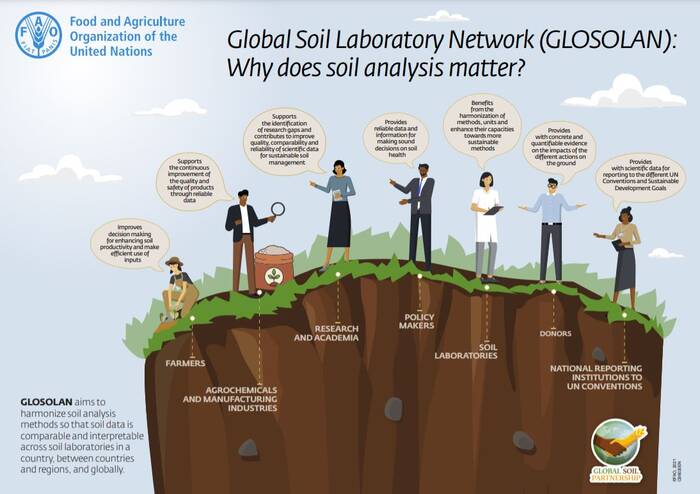GLOSOLAN FAQs
What are GLOSOLAN main areas of work?
What are GLOSOLAN main areas of work?
GLOSOLAN is working to improve the proficiency of soil laboratories in both wet and dry chemistry (soil spectroscopy) by: new
WET CHEMISTRY:
- Harmonizing Standard Operating Procedures (SOPs) for known methods;
- Developing the capacity of laboratories in Quality Assurance and Quality Control (QA/QC). This includes the organization of global and regional proficiency tests;
- Promoting good practices on Equipment purchasing/donation, use and maintenance;
- Promoting good practices on Health and safety;
- Providing regular trainings to laboratories.
DRY CHEMISTRY (soil spectroscopy):
- To support the development of all types of soil spectroscopy at national, regional, and global levels. To achieve this objective, this initiative will be supervised by a group of experienced scientists to ensure that all activities are science based.
- To support countries in establishing their own soil spectral laboratories and national soil spectral libraries with standardized methods and decentralized estimation services.
- To achieve this objective, GLOSOLAN will be using a country-driven approach and invest in capacity building activities at the national or regional level.
- To continuously support the development of the global spectral estimation services by encouraging countries to share part of existing national soil spectral libraries on a voluntary basis.
- To support the development of standards and protocols for soil spectroscopy, including but not limited to soil sample preparation, measurement protocols, quality assurance, and data analysis and modelling.
GLOSOLAN was lately asked to look also after Fertilizers analysis. Through the establishment of the International Network on Fertilizers Analysis (INFA), GLOSOLAN is expected to:
- Develop global and when appropriate regionally harmonized methods on fertilizers analysis;
- Organize global proficiency tests on fertilizers;
- Establish regional centers for training and doing the assessment of fertilizers quality;
- Developing the capacity of laboratories in fertilizers analysis through training and equipment purchasing as appropriate.
Please consult the menu on the left to access the content of each thematic area of work.
How does GLOSOLAN work?
How does GLOSOLAN work?
GLOSOLAN is a participative network in which member laboratories and experts in soil analysis share their information and experiences at the purpose of developing harmonized standards and training material that are published on the GLOSOLAN webpage for free.
Please note that there is no registration fee or any annual cost to join GLOSOLAN.
Each member of GLOSOLAN matters! GLOSOLAN decisions are made using a bottom-up approach. Every year, laboratories from a same region are given the opportunity to discuss about their priorities and needs, and their position on topics to be discussed at the annual GLOSOLAN meetings. In this regard, countries are organized into Regional Soil Laboratory Networks (RESOLANs), the skeleton of GLOSOLAN. Therefore, it is the responsibility of the each RESOLAN Chair and vice-Chair to report about the position of his/her RESOLAN and make sure that regional requests are well included in the annual GLOSOLAN work plan.
In addition to the regional networks, GLOSOLAN is promoting the establishment of National Soil Laboratory Networks. Due to the lack of financial resources, the Global Soil Partnership of FAO is able to financially support the participation of only one person per country to the RESOLAN meetings. In this regard, it is important that laboratories organize themselves into national network. The establishment of National Soil Laboratory Networks is important for several reasons:
1. It promotes harmonization processes in soil analysis at the national level.
2. It facilitates the transfer of the knowledge acquired by laboratories participating in GLOSOLAN activities at the national level. Indeed, laboratories benefitting from GLOSOLAN training should transfer the acquired knowledge to other laboratories in their country. This process is critical also for overcoming language and cultural barriers.
Please consult the menu on the left to learn more on the Regional and National Soil Laboratory Networks.
What are the differences between National Reference and other registered soil laboratories?
What are the differences between National Reference and other registered soil laboratories?
In GLOSOLAN all registered laboratories have equal rights and opportunities!
Nevertheless, the Global Soil Partnership was forced to ask its national focal points to identify one champion laboratory (National Reference Soil Laboratory) that could lead the implementation of GLOSOLAN activities at the national level and transfer the knowledge acquired in GLOSOLAN to other laboratories. This request was due to the fact that GLOSOLAN works on a limited budget that cannot satisfy the requests for financial support of all registered laboratories.
Ultimately, priority is given to the National Reference Soil Laboratories in case of:
- Shortage of soil samples for the execution of GLOSOLAN inter-laboratory comparisons;
- Shortage of budget to cover participation costs to RESOLAN and/or GLOSOLAN meetings. Please note that financial support is provided as per FAO rules and procedures. In this regard, FAO can financially support participants from developing countries only.
Learn more about the Terms of Reference of National Reference Soil Laboratories and other laboratories registered in GLOSOLAN here (AR | EN | ES | FR | RU | TR). The performance of National Reference Soil Laboratories is monitored on an annual basis. GLOSOLAN will request national focal points for the replacement of any National Reference Soil Laboratory that does not comply with its role and tasks.
Why shall I register my laboratory in GLOSOLAN?
Why shall I register my laboratory in GLOSOLAN?
By registering your laboratory in GLOSOLAN you will have the opportunity to:
- Connect with other laboratories in your country, region or in the world;
- Participate in the GLOSOLAN proficiency tests;
- Get trained on topics like internal and external quality control, health and safety, standard operating procedures, soil spectroscopy, use and maintenance of equipment and much more;
- Be promptly notified on GLOSOLAN and regional events as well as on the publication of new documents and training material.
How can I register my laboratory in GLOSOLAN?
How can I register my laboratory in GLOSOLAN?
Fill out the form (EN, ES, FR) and send it to [email protected] and to [email protected]. Once your application is processed, your laboratory will be shown on the interactive map. At the moment of their registration in GLOSOLAN, all laboratories receive a letter and a certificate of registration. Please note these documents DO NOT certify the proficiency of laboratories in soil analysis. Therefore, they cannot be used to state that a laboratory is certified under GLOSOLAN or has a good proficiency in soil analysis. The performance of National Reference Soil Laboratories is monitored on an annual basis. GLOSOLAN will request national focal points for the replacement of any National Reference Soil Laboratory that does not comply with its role and tasks.
What laboratories are registered in GLOSOLAN?
What laboratories are registered in GLOSOLAN?
All laboratories registered in GLOSOLAN are shown on the interactive map
Why is it important to invest in soil laboratories?
Why is it important to invest in soil laboratories?
Investing in more efficient labs and harmonized data has national, regional and global implications. GLOSOLAN is an efficient and effective way to:
- Provide reliable evidence to support better decision-making at both field and policy levels;
- Support countries in reporting on progress made towards the SDGs;
- Contribute to the development of international standards and indicators;
- Contribute to the assessment, monitoring and sustainable management of soil and provide quality data to support the establishment of National Soil Information Systems that can feed into the Global Soil Information System (GLOSIS);
- Assist companies manufacturing laboratory equipment in improving their products;
- Identify research gaps and increase investments in research.
Download the poster: Global Soil Laboratory Network (GLOSOLAN): why does soil analysis matter?
Who are GLOSOLAN's trainers and advisors?
Who are GLOSOLAN's trainers and advisors?
GLOSOLAN is constantly looking for highly qualified experts to involve in its activities as trainers and/or advisors. We are doing our best to keep our team as multicultural as possible in order to overcome language and cultural barriers and provide laboratories in need with as much support as possible. All our trainers and advisors work on a voluntary basis and their competency was tested.
Visit the Trainers and advisors webpage to learn more about them and get the help you need!
Moreover, as agreed in the 5th GLOSOLAN meeting, a technical committee was established in 2021 to facilitate the decision-making process of the network. The committee will be tasked to review the proposals made by the RESOLANs and GLOSOLAN on the writing of technical documents and to approve or reject the proposals and decisions which will be reported to all GLOSOLAN members by the GLOSOLAN coordinator. The Technical Committee shall not be composed of more than twenty persons, with at least one representative from each RESOLAN. The term of the members of the Technical Committee will be two years after nomination. To know more about the tasks and mandate of the GLOSOLAN technical committee please have a look at its Terms of Reference.
Feeling like joining the team? Send an email to [email protected] and to [email protected].
Can you tell me more about GLOSOLAN training system?
Can you tell me more about GLOSOLAN training system?
GLOSOLAN is organizing regular training opportunities to enhance laboratories’ technical and human capabilities. Training is organized appealing to a collaborative system in which volunteering laboratories and countries are given support to host and co-finance the trainings. Co-financing is seen as an asset to ensure the sustainability of the network, increase the attention and support of national governments on soil, and to advertise country specific strengths in soil laboratory analysis. Advanced laboratories and countries are especially invited to give their contribution, stretching their hand towards those in need.
Starting from 2021, GLOSOLAN started organizing online training sessions, in order to overcome travelling problems related to the Covid-19 pandemic.
Thanks to the support of international high-level experts, several webinars on different topics related to soil analysis were implemented. The trainings are implemented in different languages and time zones, according to the trainer's availability, in order to allow a larger audience to attend the sessions.
To know more about GLOSOLAN online training, please visit the capacity development webpage.
Can you tell me more about GLOSOLAN governance?
Can you tell me more about GLOSOLAN governance?
The appointment of the Chair of the network takes place during the annual meeting of GLOSOLAN. The term for the Chairperson is two years after election, extendable via GLOSOLAN decision to a second term. The Chair is, whenever possible, supported by a vice-Chair in all its activities and tasks. The Terms of Reference for the positions of GLOSOLAN Chair and vice-Chair are available here (AR | EN | ES | FR | RU | TR).
2021-2023
Chair: Ms Miriam Ostinelli (Argentina)
Vice Chair: Mr Elh Moudi Moustapha Abdourahaman (Niger)
2019-2021
Chair: Ms Nopmanee Suvannang (Thailand)
Vice Chair: Mr Rob de Hayr (Australia)
2017-2019
Chair: Ms Nopmanee Suvannang (Thailand)
Vice Chair: NA
The Chair and vice-Chair are supported in all their activities by the GLOSOLAN Steering Committee and the GLOSOLAN coordinator at the Global Soil Partnership Secretariat, [email protected].
Latest stories
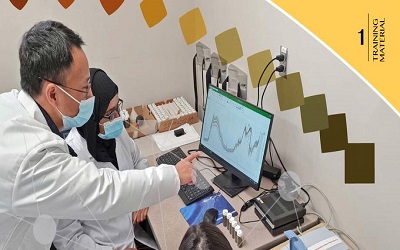
Shining the light on spectroscopy for sustainable soil management
A giant step: from wet to dry chemistry in soil analysis
Why spectroscopy is an indispensable tool in soil science.
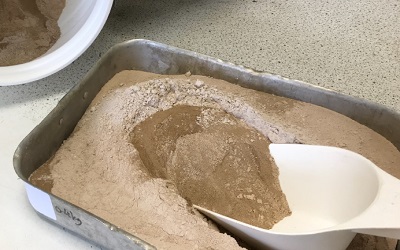
Proficiency testing 2021-22
Assessing and monitoring
Through proficiency testing the GLOSOLAN contributes to the assessment and monitoring of the performance of its’ member laboratories.
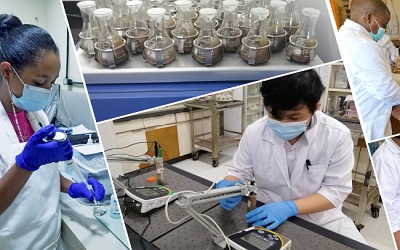
Procurement of new equipment
Boosting soil laboratory capacities
GLOSOLAN purchases equipment for laboratories in developing countries based on how they perform on the GLOSOLAN proficiency test.

Laboratories' capacities and needs
Global Soil Laboratory Assessment
The survey “Global assessment on laboratory capacities and needs” collected information on labs’ training and equipment needs and assessed their capacity.

Spectral Soil Data: Needs and Capacities
Global Soil Spectroscopy Assessment
The publication reports the information collected in the survey on the capabilities and needs of soil laboratories for collecting and managing soil spectral data.
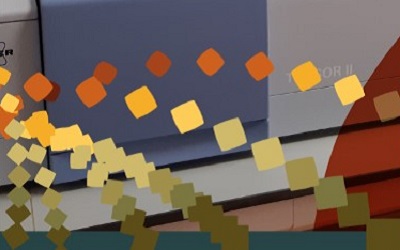
Giant leaps on Soil Spectroscopy
The first plenary meeting on soil spectroscopy
The meeting presented the initiative, the concerns, defined the governance and endorsed the GLOSOLAN work plan on soil spectroscopy for 2020-2021.
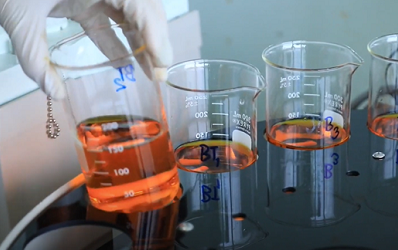
Video: SOPs for soil organic carbon
Titration and colorimetric methods, step-by-step guide
GLOSOLAN released two new videos on the Standard Operating Procedure (SOP) for measuring Soil Organic Carbon using the Walkley and Black method.
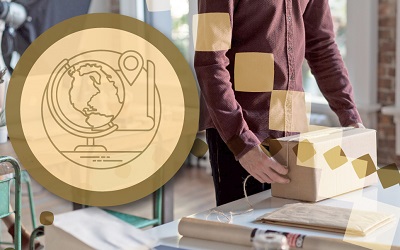
Launch of the SIMPLE database
The first global custom control procedure database
This new FAO online tool will promote and facilitate the execution of international inter-laboratory comparisons while simplifying the shipment of soil samples between countries for research purposes and/or analysis abroad.
GLOSOLAN Interactive map
The map shows all laboratories registered in the Global Soil Laboratory Network and reports:
- Laboratory name
- Laboratory acronym
- Laboratory full address
- Name of the head of the laboratory
- The Regional Soil Laboratory Network (RESOLAN) the laboratory refers to
- Date of registration in GLOSOLAN
National Reference Laboratories are displayed in green, while additional registered laboratories are colored in blue.
Network growth
The Global Soil Laboratory Network is enlarging day after day, as new laboratories become GLOSOLAN members.
Job opportunities in soil laboratories
Is your laboratory/institute opening any vacancy? Let us know, we will inform our GLOSOLAN members about it!

Post-Doc in soil remote sensing - Deadline: 20.08.2022
Employer: Tel Aviv University
Location: Tel Aviv, Israel

Spectroscopist - IR Analyst - Deadline: 26 August 2022
Employer: James Hutton Institute
Location: Aberdeen, United Kingdom

PhD on next-generation soil spectroscopic modelling with explainable machine learning - Deadline: 01.09.2022
Employer: Curtin University
Location: Australia

Analyst/Lab technician/Chemist - Deadline: 30 September 2022
Employer: JV "Ifoda Agro Kimyo Himoya LLC"
Location: Namangan, Uzbekistan
GLOSOLAN Meetings
National Soil Laboratories and Regional Soil Laboratory Networks joined forces to work towards harmonization of data, data analysis and methodologies.

Fifth meeting
Online, Zoom platform | 23 - 25 November 2021
More information soon available
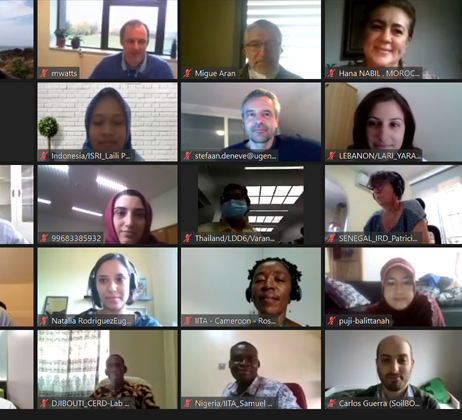
Fourth meeting
Online, Zoom platform | 11 - 13 November 2020
Due to the COVID-19 pandemic, the meeting was organized virtually and was attended by 567 participants from 95 countries.
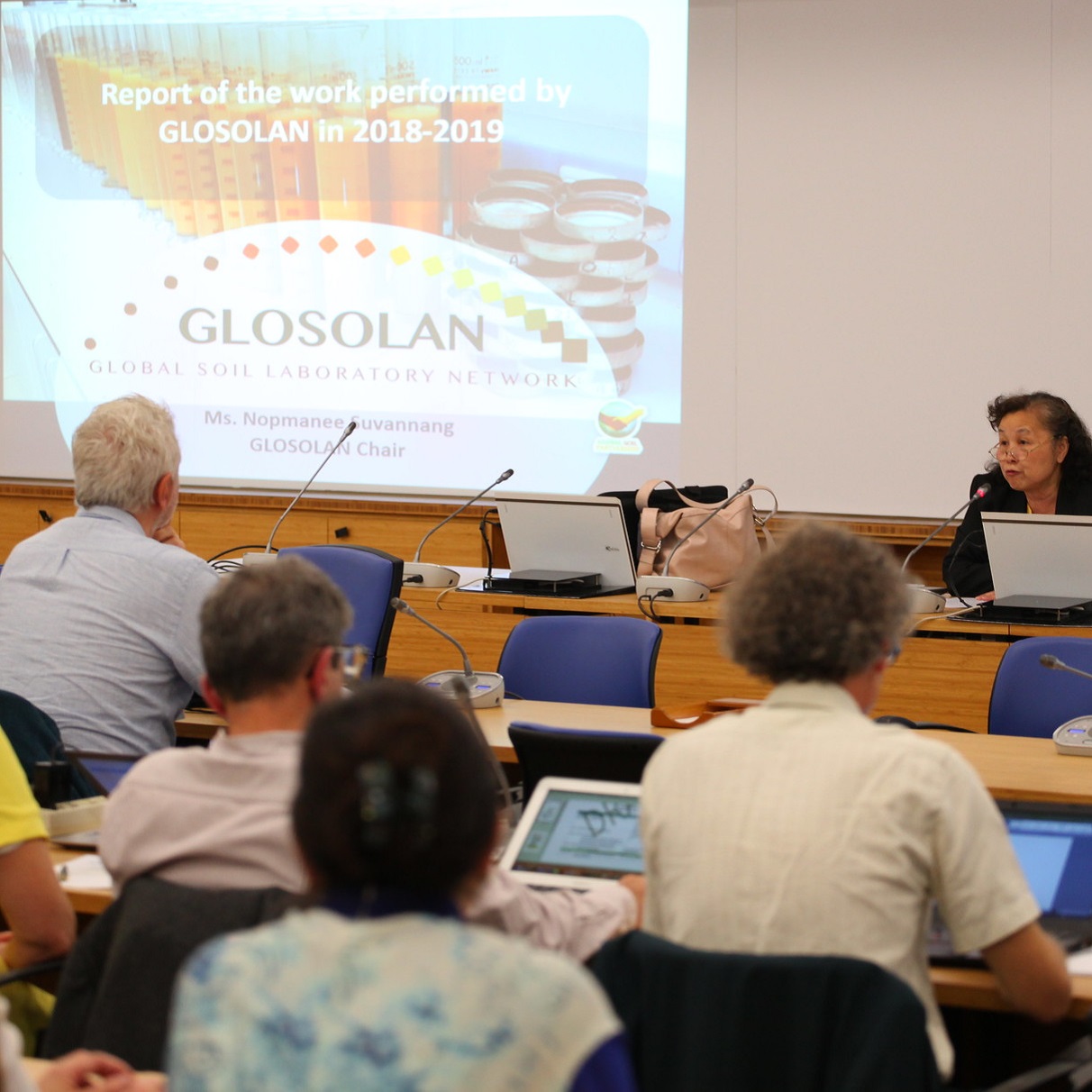
Third meeting
FAO headquarters, Rome, Italy | 28 - 30 October 2019
GLOSOLAN Chair reported on the activities implemented by GLOSOLAN in 2018-2019 noting that the work plan agreed for was fully implemented.
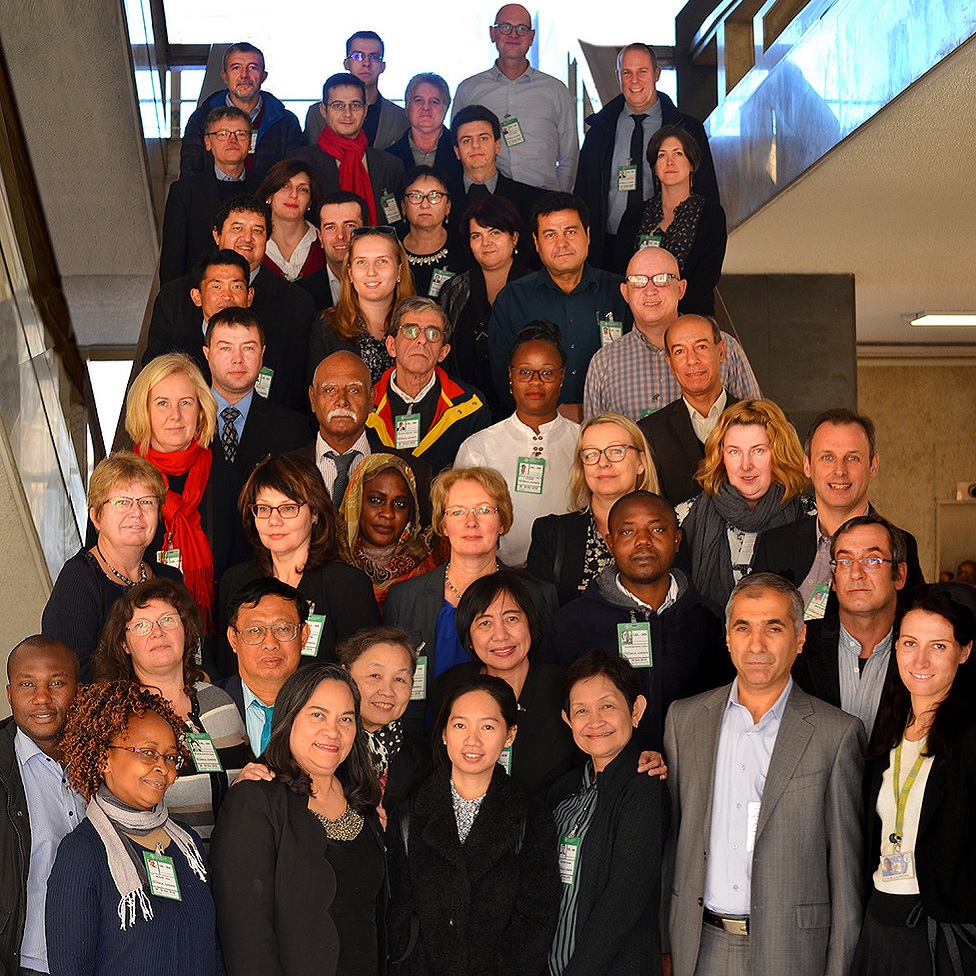
Second meeting
FAO headquarters, Rome, Italy | 28 - 30 November 2018
A first global survey was launched to identify laboratory priorities and to assess regional differences in procedures and methodologies.
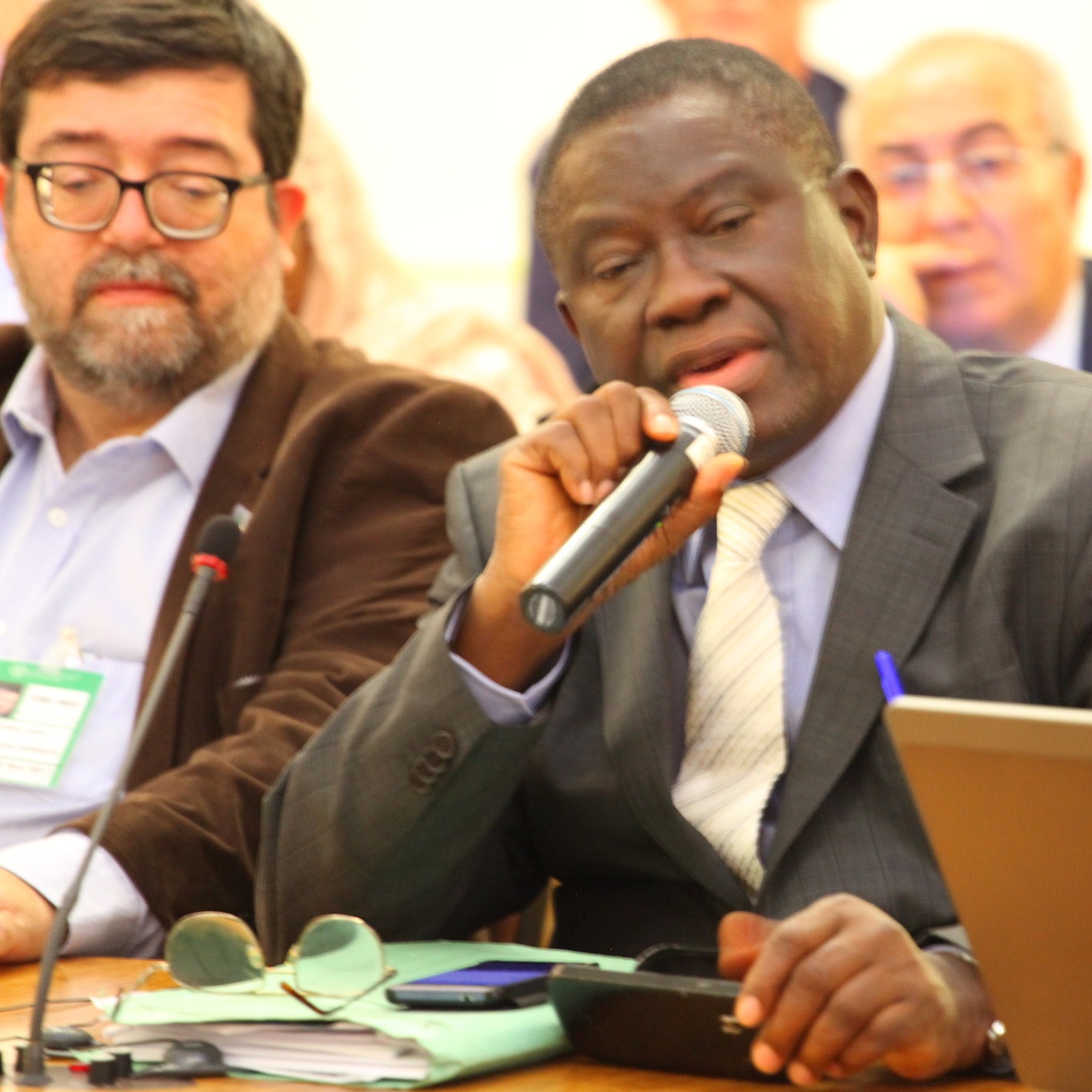
First meeting
FAO headquarters, Rome, Italy | 1 - 2 November 2017
During its first meeting GLOSOLAN agreed upon a concrete roadmap and ToRs for the network and its Chair.
Constitutional documents
Terms of reference (TOR) - GLOSOLAN Spec Governance
AR | FR | EN | FR | RU | ES
Resolution on the international exchange of soil samples
Resolution | Full report of COAG 27th session
Terms of reference (TOR) - GLOSOLAN Technical and Steering Committees
AR | FR | EN | FR | RU | ES
Terms of reference (TOR) - Governance of the Regional Soil Laboratory Networks (RESOLANs)
AR | FR | EN | RU


